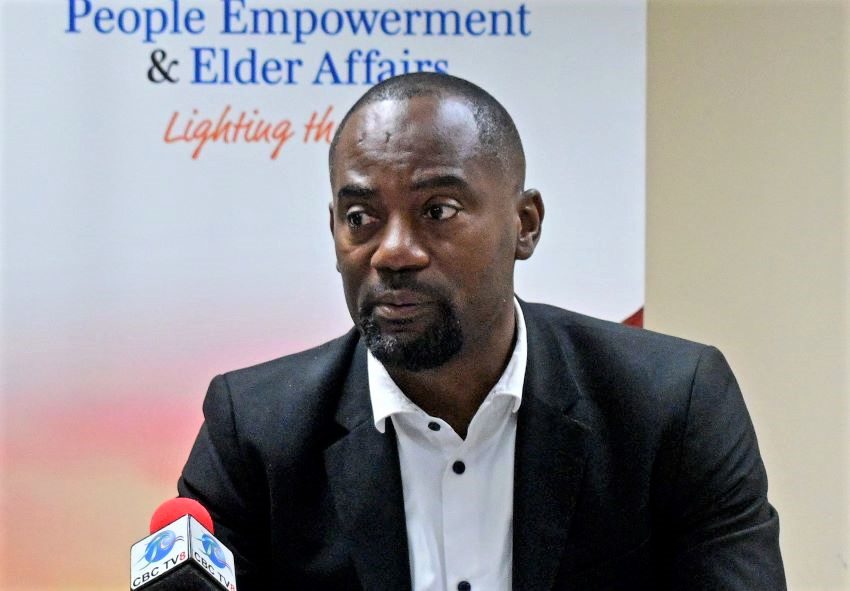
Assessing the level of poverty in Barbados will be a key focus for Government this year, and it will be working in tandem with the Caribbean Development Bank (CDB) and the Inter-American Development Bank (IDB) to ensure this comes to fruition.
This was highlighted today by Minister of People Empowerment and Elder Affairs, Kirk Humphrey, during a post-Cabinet press conference at Webster’s Industrial Park, Wildey, St. Michael. It was chaired by Minister of Home Affairs and Information, Wilfred Abrahams, and also attended by Minister in the Prime Minister’s Office with responsibility for Culture, Senator Dr. Shantal Munro-Knight.
Explaining that there would be a programme called the Enhanced Country Poverty Assessment, Minister Humphrey said: “Barbados will be proceeding on a poverty assessment to have a clear understanding as to the level of poverty in Barbados; to calculate the poverty line and to calculate the number of households that are in poverty. You would appreciate that this poverty study is necessary in order for us to make proper decisions as is the case for any decision making. You need to have the relevant data to be able to do so.
“The reality is, as well, that COVID would have made any poverty statistics that we had prior to COVID pretty much irrelevant. And therefore in the best of circumstances, you should probably have updated … poverty data every two years.”
Noting that the last poverty study undertaken on the island was in 2016, he said that at that time it showed Barbados as having 17.2 per cent of households in poverty, while the previous one done in 2010, showed 15 per cent of Barbadian households were in poverty, and the one prior to that, undertaken in 1997, indicated that 8.7 per cent of Barbadian households were in poverty.
He stressed the poverty line was not a static one but was calculated based on what the evidence would suggest over the data collection period.
Mr. Humphrey explained that the poverty assessment has four components. The first is institutional assessment, where government would have to determine the agencies responsible for delivering programmes that would cause persons to experience less poverty. These would include the Ministries of People Empowerment and Elder Affairs, Health and Wellness, and Education.
The Minister said the other components are macro-social assessment, participatory poverty assessment, and the Survey of Living Conditions/Household Budget Survey, which should cost Government BDS $1.3 million to undertake with the support of the CDB.
Explaining what the last component involved, Mr. Humphrey stated: “Most people know of a poverty study. This is where you get your poverty line. This is where you get your vulnerability line. This is where you’re able to establish the amount of money that is necessary to be able to have a decent life, above poverty in a country and this is what most people are aware of.”
The Minister noted that the IDB had already paid BDS $270,000 for the design of the survey instrument, but that the CDB would be carrying most of the costs. He said the CDB would also be bringing on board consultants to help Government execute the Enhanced Country Poverty Assessment and ensure capacity building of agencies involved in the poverty assessment.
Pointing out that the data collection component should take six months, he said: “The next few steps is that for the next two months until the end of the financial year, we will be designing the instrument, hiring the consultants, with the Caribbean Development Bank, and so on. And then from April 1, the intention is to start the data collection. And, that process lasts six months because you want to get as much information over that period of time.
“The IDB study normally lasts a year – the data collection component. The CDB component is six months, that allows us to be in a position to make serious determinations about ‘how do we treat to poverty?’, ‘who is experiencing poverty?’ ‘Where is that poverty?’, ‘Do we need to make new adjustments to the Government’s social programming?’ Because you really cannot make decisions if you do not have the data.”
Minister Humphrey thanked both financial institutions for their involvement and for being “good partners to the Government”. Stating that the CDB had given Government access to a gender specialist to be able to do some of this work and a social policy advisor, he stressed: “So by the end of the year, we’ll have this new, more accurate reflection as to the level of poverty in Barbados. And therefore, we will then be able to make decisions going forward about how we would seek to address the levels of poverty in Barbados.”
